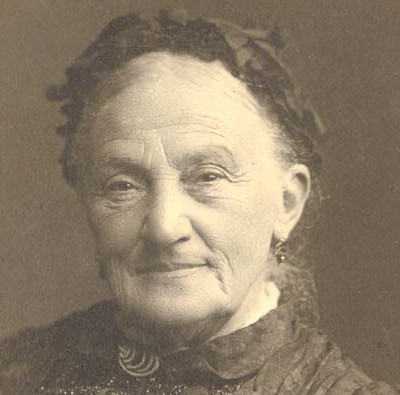
Helene Einstein (1825-1909) and Max Hirsch (1834-1862) immigrated to the United States separately from Germany in the first half of the 1800s. Einstein came from Laupheim, in the Kingdom of Wuertemberg, in the late 1840s or early 1850s. Hirsch came from Karlsruhe as a young boy. They married in Minnesota, in 1858. The following year, they had a son, Isaac E. Hirsch. In 1861, to escape “the Indian disturbances of the Northwest,” as various newspaper accounts about the family later described it, they came to Pittsburgh. The following year, Max Hirsch died. At the time, Helene Hirsch was pregnant with their second child, Louis Hirsch.
Helene Hirsch spent much of her life in a house at 19 Pride Street, in Uptown. She became a fixture in the community, known affectionately as “Grandma Hirsch.” She took a special interest in orphans. She celebrated her 80th birthday by donating 66 boxes of candy to the children of the Gusky Orphange and regularly made similar donations to the local German Presbyterian Orphanage. She was a member of Rodef Shalom Congregation. The pallbearers at her funeral included the prominent businessmen Herman Obernauer and Isidore Jacobs. After Grandma Hirsch died, her sons, Isaac and Louis Hirsch, sold 19 Pride Street to Bertha Brunwasser for $4,500.
About 1870, as a young boy, Isaac E. Hirsch (1859-1942) took a job at Max Schamberg & Company, a steamship and foreign banking company. He stayed with the firm for 30 years, eventually purchasing the company in 1887. Isaac and his brother Louis later started the Neeb-Hirsch Publishing Company, which published the Volksblatt und Freiheits-Freund, a widely read German language newspaper in the city. Its original offices were located next door to the Pittsburgh City Hall on Smithfield Street, until the municipal building was demolished in 1904. Isaac Hirsch was also president of the German American Newspaper Publishers Association.
Isaac Hirsch spoke several languages, including Italian and French. He often published verse in local newspapers. Composers often set his words to music. He was a member of the Arts Society of Pittsburgh, along with Samuel Floersheim.
As secretary of the group, Hirsch advocated for the creation of a free arts academy in the city and the elimination of billboards from public roads. Isaac Hirsch was strongly against any American involvement in World War I. “Dollars stained with the blood of our fellowmen have stifled the American conscience and made us blind and deaf to the tears and sobs of widows and orphans,” he wrote in a June 1915 letter. Isaac Hirsch married Margaret Bradley in 1885. They had a daughter, Annette Hirsch.
Louis Hirsch (1862-1935) attended public schools before joining his brother in the newspaper business. In 1906, Hirsch successfully ran for a seat of the Common Council, the lower body of an early bicameral version of the Pittsburgh City Council. He represented the 20th Ward, which covered much of the present-day neighborhoods of Bloomfield and Shadyside. The Jewish Criterion strongly endorsed Hirsch’s candidacy, writing, “It is important that no member of our community shirk this duty of exercise of suffrage which is the protection of our civic rights and that he will see to it that his ballot is voted for the man who will consider the interests of the people.” In 1908, Hirsch helped defeat a $75 per game tax on Barney Dreyfuss’ Pittsburgh Baseball Club.
Louis Hirsch married Rose Rice of Ohio. They lived at 301 Roup Street in Baum Grove, which is now the Friendship neighborhood of Pittsburgh. They had two children, Hermine and Max.
Max Hirsch (1887-1952) graduated from Shady Side Academy and Lafayette College in Easton, Pa. In September 1921, he started the Pittsburgh Radio and Appliance Company Inc., the first store in downtown Pittsburgh devoted exclusively to radios and radio equipment.
In 1914, Hirsch married Jane Rose Goldberg, of Braddock, Pa. They lived on Bennett Street in Homewood before moving to Northumberland Street in Squirrel Hill. They had a son, Burton.
Burton L. Hirsch (1918-2011) attended Taylor Allderdice High School and graduated from Shady Side Academy, Washington and Jefferson College and the Eccles College of Mortuary Science in Philadelphia. In February 1942, he joined the U.S. Army, serving in the medical corps. While stationed at Camp Stewart, Ga., Hirsch was promoted to sergeant technician for his “service above self” during a meningitis scare on the base. During the war, he worked at military medical centers in Virginia, Texas and Indiana, rising to the rank of second lieutenant.
In 1947 or 1948, Hirsch established the Burton L. Hirsch Funeral Home Inc. at 2704 Murray Avenue, billing his business as “the only Jewish funeral home in Squirrel Hill.” In 1964, Hirsch was invited to join the National Selected Morticians and elected president of the Jewish Funeral Directors of America. He was later chairman of the Pennsylvania State Board of Funeral Directors. Hirsch sold the business to a national chain in about 2004, although the business continued to operate locally under his name. A fire destroyed the building in 2009.
In 1948, Burton Hirsch married Ruth Constance Leff (c.1920-2010), of Pittsburgh. She ran the funeral home in partnership with her husband. They had two children, Maxine and Loren.